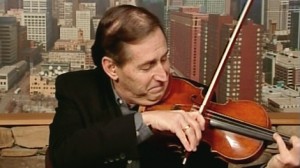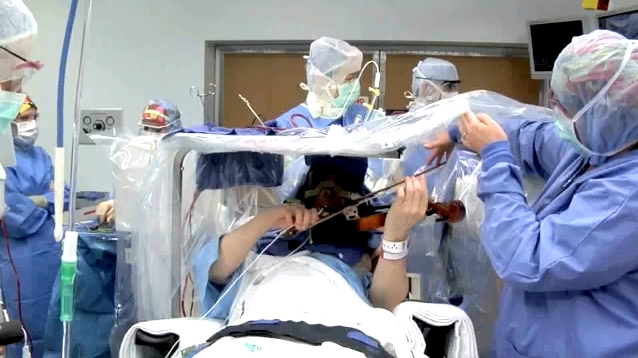In my first article I told you about Roger Frisch, an amazing artist-violinist who successfully underwent brain surgery last spring while playing violin. Mr. Frisch, who has resumed his position as Associate Concertmaster with the Minnesota Orchestra, graciously consented to speak to String Visions about his experience since then.
Frisch continues to enjoy a long, successful career with the Minnesota Orchestra after first studying with his father Wilbert Frisch, Associate Concertmaster with the Pittsburgh Symphony, and then completing a master’s degree with Joseph Gingold. Happily, Mr. Frisch’s violinistic skills are quite intact. He was able to play in a full-length sextet performance a mere three weeks following his brain surgery, and resumed performing with the orchestra after about four weeks. Now, he says the tremor is “nonexistent.”
Mr. Frisch noticed a trembling in his bow arm that began interfering with his ease of bowing. It took a couple of years to sort out the diagnosis and for him to agree to the still experimental Deep Brain Stimulation procedure surgery for a common neurological condition known as essential tremor “ET.” [1] While ET is often mild, it may progress and become severe. The cause of ET is not always known, although in about half the cases it involves an inherited genetic mutation. It takes only one parent with the mutation to pass on the tremor disorder.
For many who experience ET it is often only a bothersome, episodic inconvenience. For a fine violinist, it can be much more serious because of the exquisite attunement between instrument and player that develops over time. Frisch was “in no way ready to pack up my career, I’m having too much fun.” He attributes the success of his surgery not only to his fine team of doctors, engineers, and others involved at the Mayo Clinic, but to his personal faith, support and prayer from family and friends.
During the first part of the surgery, Mr. Frisch was awake while he was “bolted onto the table” with a metal “halo” device attached to his head. In the hour and a half before his main surgeon, Dr. Kendall Lee, came into the surgical suite, Mr. Frisch was monitored with MRI’s and with measurements of the tremor as he played violin, bowing long notes. Mayo actually bought the violin and bow he used–fortunately there was no need for him to trust his actual performance violin to the surgeons and technicians!
While he played, the surgeon inserted thin wires deep into his brain structure. After the first wire, Frisch felt a difference immediately, but the tremor was still there. He described himself as “fascinated” by the process, being a “gadget kind of guy.” He was far from alone in the room; there were about 25 people there including news people and others interested in the procedure. His surgeon asked if he wanted to try a second wire, and Frisch replied, “Why not?” With the second wire the tremor was completely gone. The crowd broke into applause.
Of course, Roger Frisch is now also well-known for the surgery. His is the most successful of the DBS procedures performed thus far. Is it possible that this ongoing success story and recovery may be due in part to the development of Mr. Frisch’s violinist brain? String players’ brains continue to be a major focus of research because of their unique features and superior brain development. [2] Thus the larger story here may be the story of this violinist’s talent and ability to contribute to healing himself in ways still unclear to scientists.
Source material came from personal correspondence. Haun, S. (2011). Personal online and telephone conversation with Roger Frisch, January 20.
[1] Mayo Clinic: Essential tremor; 2010. http://www.mayoclinic.com/health/essential-tremor/DS00367
[2] Elbert, T., Panto, C., Wienbruch, C., et al. (1995). “Increased cortical representation of the fingers of the left hand in string players.” Science (270) Oct., p. 305.
















[…] a follow-up interview with String Visions, Frisch indicated his tremors are now “nonexistent” and after 4 weeks he was able to […]
[…] diagnosed with essential tremor (ET), a common neurological condition that, for many, is just a bothersome inconvenience. But for a violinist who requires ultra-fine motor control to communicate with his instrument, it […]
[…] […]